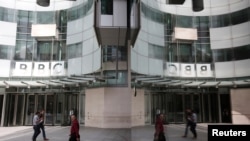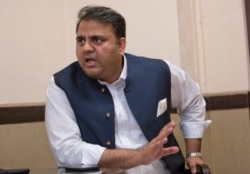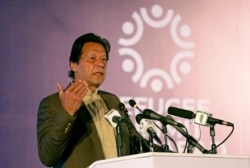Britain’s BBC’s Urdu Service Friday ended its contract for its half-hour, five-day-a-week television news show on Pakistan’s AAJ News channel, due to what the BBC said was continued interference in its programs.
“We have experienced interference in our News bulletins since October 2020 and gave AAJ TV ample time to return the program to air,” said a statement from the director of World Service Group, Jamie Angus.
‘Since this interference continued, despite efforts in good faith on both sides, the BBC had no alternative but to end the partnership with immediate effect,” the statement said.
Shahab Zuberi, the channel’s CEO, refused to comment when contacted by VOA.
The BBC had been running its half-hour news show on AAJ TV since 2015. Over the years, the show was taken off air several times but for a few days only. This time, the show was taken off air in October and has not returned.
VOA’s Urdu language service has a similar half-hour, five-day-a-week news show on AAJ TV. VOA has also experienced occasional disruptions with its show’s airing, as well as occasional censorship of content within a show without prior warning.
Insiders from across the Pakistani media landscape say the pressure to censor content comes from multiple fronts, including government officials or institutions filing cases against journalists to intimidate them, Islamist extremists who threaten violence, and the judiciary that threatens contempt-of-court notices.
However, the most intense pressure comes from Pakistan’s powerful military that has either directly or indirectly ruled the country for most of its 70-year existence and continues to wield immense control.
VOA’s Urdu and Pashto language websites in Pakistan were blocked in 2018 over coverage of an ethnic rights movement called the Pashtun Tahaffuz Movement. The movement had an antagonistic relationship with the military, which it accused of human rights violations in Pakistan’s tribal areas bordering Afghanistan.
The military, on the other hand, accused the movement of receiving funding from the intelligence agencies of Afghanistan and India to malign Pakistan and undermine the advances it made in clearing up the tribal areas of militant groups.
Pakistan’s then-information minister, Fawad Chaudhry, claimed the sites were blocked for "false and prejudiced reporting."
"The stories they were doing were only projecting a particular narrative without any impartial view. There are many things happening in our country, and most are positive," he said at the time.
More than two years later, the websites remain blocked.
Pakistan fares poorly in international press freedom indices, ranking 145th out of 180 countries in Reporters Without Borders 2020 World Press Freedom Index.
“The influence of this military ‘establishment,’ which cannot stand independent journalism, has increased dramatically since Imran Khan became prime minister in July 2018,” the organization’s website says describing the press freedom situation in Pakistan.
Human Rights Watch’s World Report 2021, published this week, says media in Pakistan face a “climate of fear” impeding coverage and forcing journalists to self-censor.
News channels in Pakistan sometimes disappear from a lineup on cable without warning, or are moved to a different, much higher number, making them difficult to find. Journalists have faced enforced disappearances, death threats, or online harassment.
Last year, journalist Matiullah Jan was abducted from outside his wife’s school, only to be released 10 to 12 hours later after intense pressure from journalists’ organizations, rights groups, and opposition political leaders.
Three journalists, Absar Alam, Bilal Farooqi, and Asad Ali Toor were charged with sedition for comments they made on social media.
Mir Shakil ur Rehman, the owner of Jang and Geo group, one of Pakistan’s largest media companies, was arrested in March over alleged corruption in a 34-year-old property transaction and remains in custody.
Local Urdu language services of the BBC and The Independent, also British, recently faced online hate campaigns including thousands of trolls.
“Calling for journalists to be murdered, with the aim of intimidating and silencing anyone critical of the authorities, is completely unacceptable,” Reporters Without Borders said in a press release, calling on the government to disown the campaigns.
Arsalan Khalid, Prime Minister Imran Khan’s focal person for digital media, said the definition of harassment needed to be clarified.
“Wherever there is real harassment, whether it’s journalists, or women, or anyone else, the government has zero tolerance for that,” he said, but added that action required “exact, specific proof.”
“You cannot call it harassment if social media users, with facts and figures, correct some fake news filed by a journalist,” he said.
Khan has repeatedly claimed that Pakistani media are freer than are media in many European countries. Khan and his ministers point to the daily talk shows on the more than a dozen television news channels in Pakistan that invite both government and opposition leaders as guests and allow a heated debate on the government’s performance.
The Human Rights Commission of Pakistan, an independent rights watchdog, expressed concern on what it called the “growing censorship in Pakistan” in one of its press releases in October last year. However, its general secretary, Harris Khalique, put partial blame on opposition political parties for not highlighting the issue.
“The opposition parties have raised the issue of freedom of expression but neither initiated any debate in the parliament nor encouraged enough of a public outcry,” he said, adding that the voice of a political leader carries much more weight than the voice of a rights activist.
He also decried “the erosion of the institution of editor.”
Over the years, owners have increasingly taken on the job themselves and Khalique said they were more likely to allow their commercial concerns to determine editorial policy.
“Hence, the pushback to censorship and curbing of dissent that we had witnessed during similar regimes in the past seems to have weakened now,” he said.






